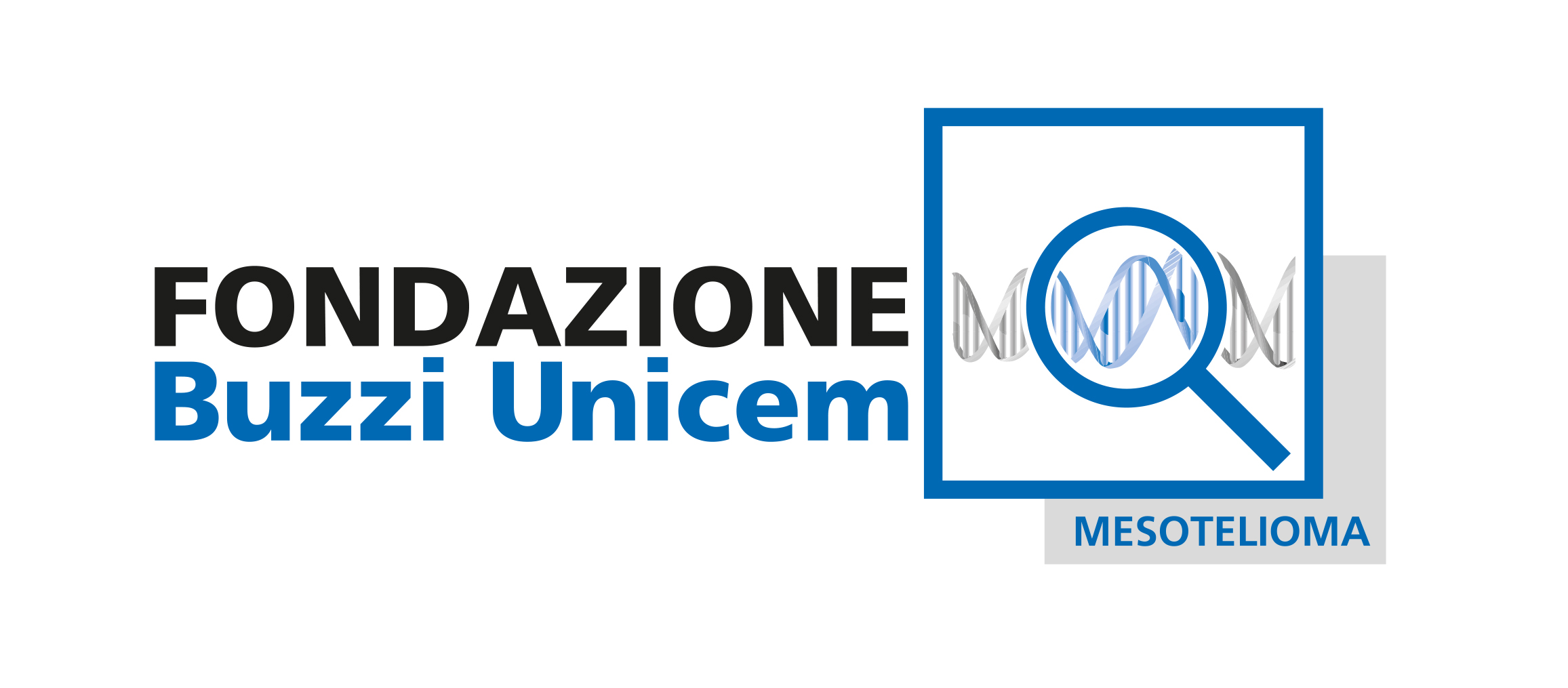A phase II study of the combination of gemcitabine and imatinib mesylate in pemetrexed-pretreated patients with malignant pleural mesothelioma
SUMMARY OF THE RESEARCH PROJECT
FUNDED BY THE BUZZI UNICEM FOUNDATION
PROJECT TITLE:
A phase II study of the combination of gemcitabine and imatinib mesylate in pemetrexed-pretreated patients with malignant pleural mesothelioma
PRINCIPAL INVESTIGATOR:
Dr. Armando Santoro, Istituto Clinico Humanitas, Rozzano (Milan)
STUDY COORDINATOR:
Dr. Paolo Andrea Zucali, Istituto Clinico Humanitas, Rozzano (Milan)
PROJECT STATUS:
Completed
BACKGROUND AND RATIONALE
Many malignant pleural mesothelioma (MPM) patients are candidates for chemotherapy with a single agent or in combination with other treatments.
According to the results of a large Phase III study, a combination of cisplatin and pemetrexed has become the standard 1st-line chemotherapy even though Phase II study results have also shown efficacy in combination with carboplatin. Unfortunately, the disease will progress in almost all patients after 1st-line therapy. Second-line therapies are increasingly used because patients are often in good clinical condition at the time of disease progression. However, the role of these therapies in MPM still needs to be demonstrated and optimal regimens have not yet been defined.
The beta-platelet-derived growth factor (PDGFR-beta) is often expressed in MPM, so could be considered a promising therapeutic target. Imatinib mesylate (STI571, Glivec) is a selective tyrosine kinase inhibitor for enzymes such as BCR-Abl, C-kit, C-fms, and PDGFR-beta, and improves the absorbance of chemotherapy drugs by decreasing interstitial fluid pressure. In vitro studies have shown that imatinib (IM) mesylate has synergistic potential with gemcitabine (GEM) and pemetrexed in PDGFR-beta positive mesothelioma cells.
In an in vivo model, GEM inhibited tumor growth, while pemetrexed was not effective even at the highest dose tested. A combination of GEM and IM versus GEM alone further inhibited tumor growth and improved survival of the study mice, demonstrating a reduction in the rate of proliferation of tumor cells and an increase the number of apoptotic tumor cells. In vivo studies in a xenotransplant murine model of human malignant mesothelioma, GEM showed greater efficacy when administered in combination with IM. Various Phase I studies have been conducted investigating IM in combination with GEM in solid tumors. .
THE STUDY
The purpose of the study is to evaluate the anti-tumor activity of imatinib mesylate in combination with gemcitabine in patients with resectable MPM expressing PDGFR-beta or C-kit cells as determined by immunohistochemistry (IHC).
This is a single-center Phase II study. Treatment will continue until disease progression and will be discontinued if the patient withdraws consent or experiences intolerable side effects.
DEMOGRAPHIC CRITERIA AND PATIENT SELECTION
Potranno essere arruolati in questo protocollo i pazienti affetti da mesotelioma pleurico maligno pre-trattati con pemetrexed che esprimono PDGFR-beta e / o C-kit mediante immunoistochimica (IHC).
INCLUSION CRITERIA
1) Age > 18 years
2) Patients with histologically documented MPM expressing PDFGR-beta and/or C-Kit determined by IHC
3) Unresectable, locally advanced or metastatic disease
4) Disease progression confirmed by modified RECIST criteria and documented after pemetrexed-based chemotherapy
5) ECOG performance status of 0.1 or 2
6) Life expectancy of at least 3 months
7) Informed written consent
EXCLUSION CRITERIA
1) Coexisting cancer of a different histological origin, with the exception of non-melanoma skin cancer and/or in situ cervical carcinoma
2) History of previous cancers of a different histological origin that have not been in complete remission for at least 5 years
3) Unresolved side effects from previous cancer treatment
4) Primary peritoneal mesothelioma
5) One of the following abnormal hematological values:
a. Hb <9 g / dl
b. GB < 3 x 109 / L
c. Neutrophils <1.5 x 109 / L
d. Platelets < 100 x 109 / L
e. Serum bilirubin > 2.5 mg / dL
f . ALT and AST > 3 x UNL (unless due to hepatic metastases)
g. Serum creatinine > 1.5 mg / dL
6) Symptomatic and/or unstable pre-existing cerebral metastases. To be enrolled in the study, subjects must have stable disease confirmed by MRI or CAT scan performed within 4 weeks of Day 1 of the first treatment cycle and must have central nervous system metastases well controlled by steroids, anti-epileptics or other symptomatic drugs
7) Clinically significant cardiovascular disease such as: myocardial infarction or other severe coronary disease in the previous 6 months, cardiac arrhythmia requiring medication, uncontrolled hypertension, heart failure manifestations or uncompensated congestive heart disease classified NYHA II or higher
8) History of psychiatric illness that may interfere with the ability to provide adequately informed consent
9) Pregnant or breastfeeding women or women unable to comply with a medically approved contraceptive regimen during the study period (including 3 months following treatment)
10) Uncontrolled active infections
11) Any condition that, at the discretion of the investigator, may place the patient at unnecessary risk or interfere with the results of the study
